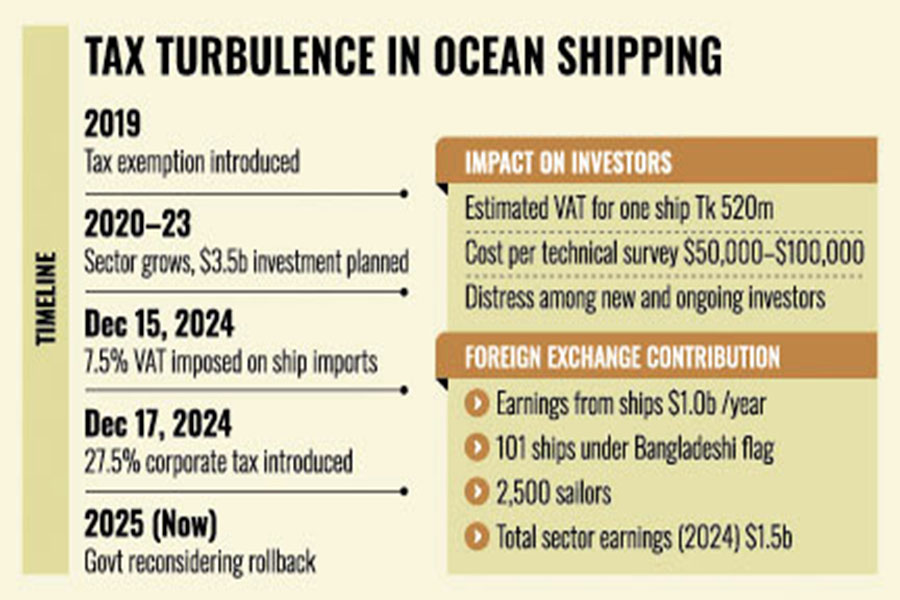Ocean-going ship imports may get tax exemption again
VAT rollback under review as sector reels from sudden policy shift

Published :
Updated :

The government is rethinking its decision to impose a 7.5% VAT on the import of ocean-going ships, following strong backlash from local investors and concerns over potential damage to a booming foreign exchange-earning sector.
After promising tax exemptions until 2030, the sudden reversal last December caught ship owners and investors off guard, just as they were committing billions of dollars based on long-term incentives.
With around US$3.5 billion already in the pipeline, stakeholders now warn that the loss of fiscal support is discouraging further investment in an industry that has emerged as the country's second-largest source of foreign currency.
The National Board of Revenue (NBR), which introduced the VAT in December 2024 in line with International Monetary Fund (IMF) conditions to boost tax-to-GDP ratios, is considering waiving the tax to prevent further damage, officials said.
Industry insiders said investors had begun injecting around $3.5 billion based on a long-term government commitment that promised tax exemption until 2030. The sudden withdrawal of this tax break came as a surprise to many of them.
Local investors said the removal of fiscal incentives is discouraging for a sector that holds significant investment potential.
Officials at the NBR said the tax benefits had been phased out in accordance with conditions from the International Monetary Fund (IMF), aimed at increasing the country's tax-to-GDP ratio.
However, in light of growing concerns from local investors and the importance of foreign exchange earnings, the NBR is now reconsidering the VAT waiver, they added.
Azam J Chowdhury, Chairman of the Bangladesh Ocean-going Ship-owners Association (BOGSOA), noted that ocean-going ship owners bring in foreign currency without any government investment.
"When the government repealed the tax on ship imports in 2019, many investors initiated technical surveys to purchase new ships, with each survey costing between $50,000 and $100,000," he told The Financial Express.
He added that those investors are now distressed over the future of their planned investments.
"There are cumulative impacts of this VAT, which also applies to other services such as bunkering, crew, and procurement, increasing the effective tax burden," he added.
Following the introduction of incentives, the ocean-going shipping business emerged as the country's second-largest source of foreign exchange, Mr Chowdhury said.
"I've calculated that my company will have to pay Tk 520 million in VAT for just one ship if the 7.5 per cent VAT remains in place," he said.
He pointed out that the government is currently receiving $1.0 billion annually in foreign currency from ship owners.
The imposition of taxes on ocean-going ship owners, he added, is undermining the potential of this booming sector and deterring investors from moving forward.
"We had to convince the government through four years of negotiations to waive taxes in 2019, and it paid off," Mr Chowdhury said.
Bangladesh spends about $10 billion annually on freight charges due to its heavy reliance on international trade.
More than 90 per cent of the country's external trade is conducted via sea routes. National flag carrier ships have the potential to reduce pressure on freight bills for both exports and imports.
On December 15 in 2024, the NBR imposed a 7.5 per cent VAT on the import of ocean-going ships.
Just two days later, on December 17, it imposed a 27.5 per cent corporate tax on income derived from ocean-going ships, scrapping the tax benefit that had been valid until 2030.
Each year, some 4,000 to 5,000 ships enter Bangladesh's seaports due to the country's heavy dependence on import trade.
Yet Bangladesh's share in the $12-14 billion regional freight market remains negligible, owing to the limited number of national flag carriers.
"Bangladesh earned $1.5 billion last year from freight and sailor salaries alone, thanks to a fleet of 101 ships and 2,500 seafarers," Mr Chowdhury added.
doulotakter11@gmail.com


 For all latest news, follow The Financial Express Google News channel.
For all latest news, follow The Financial Express Google News channel.